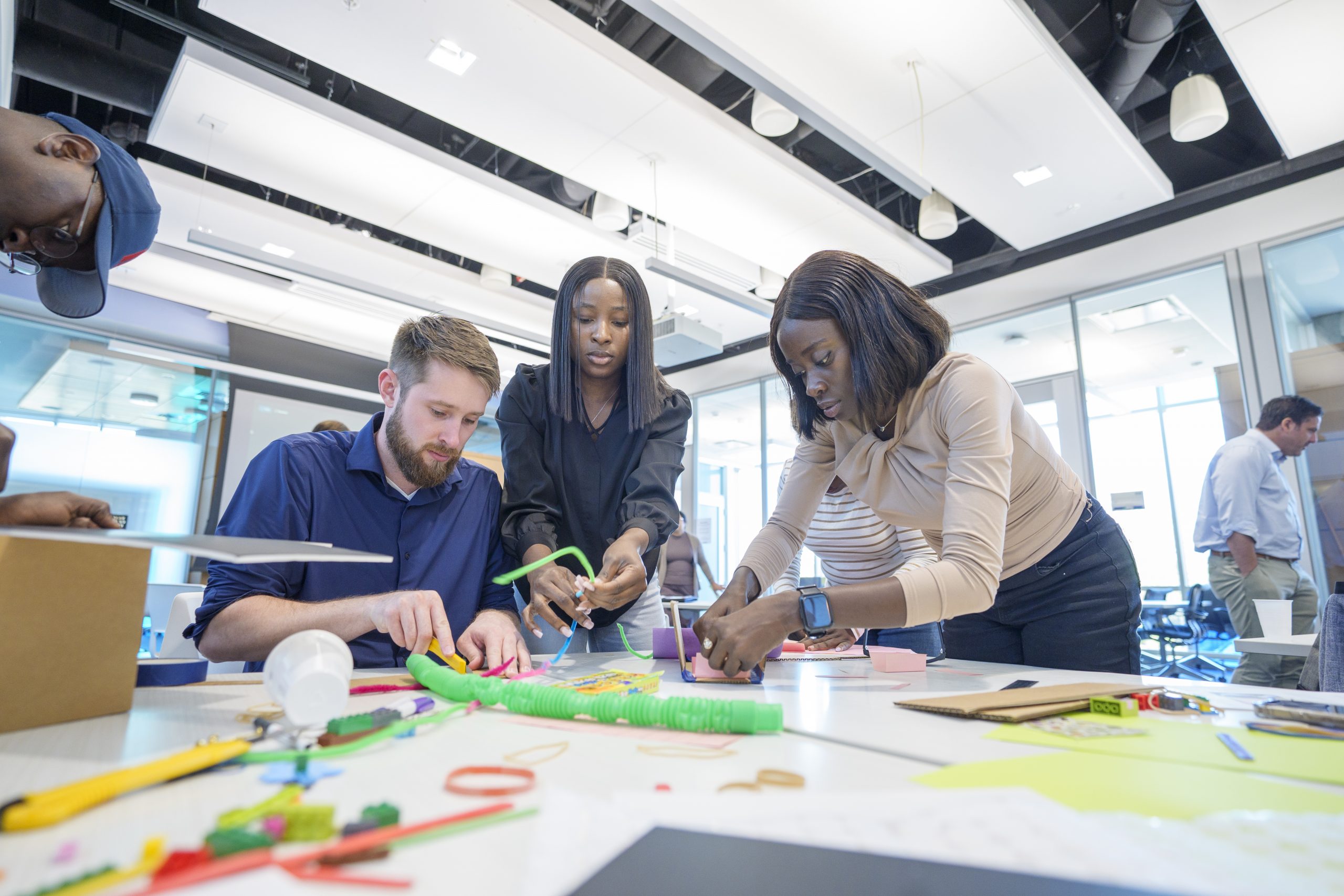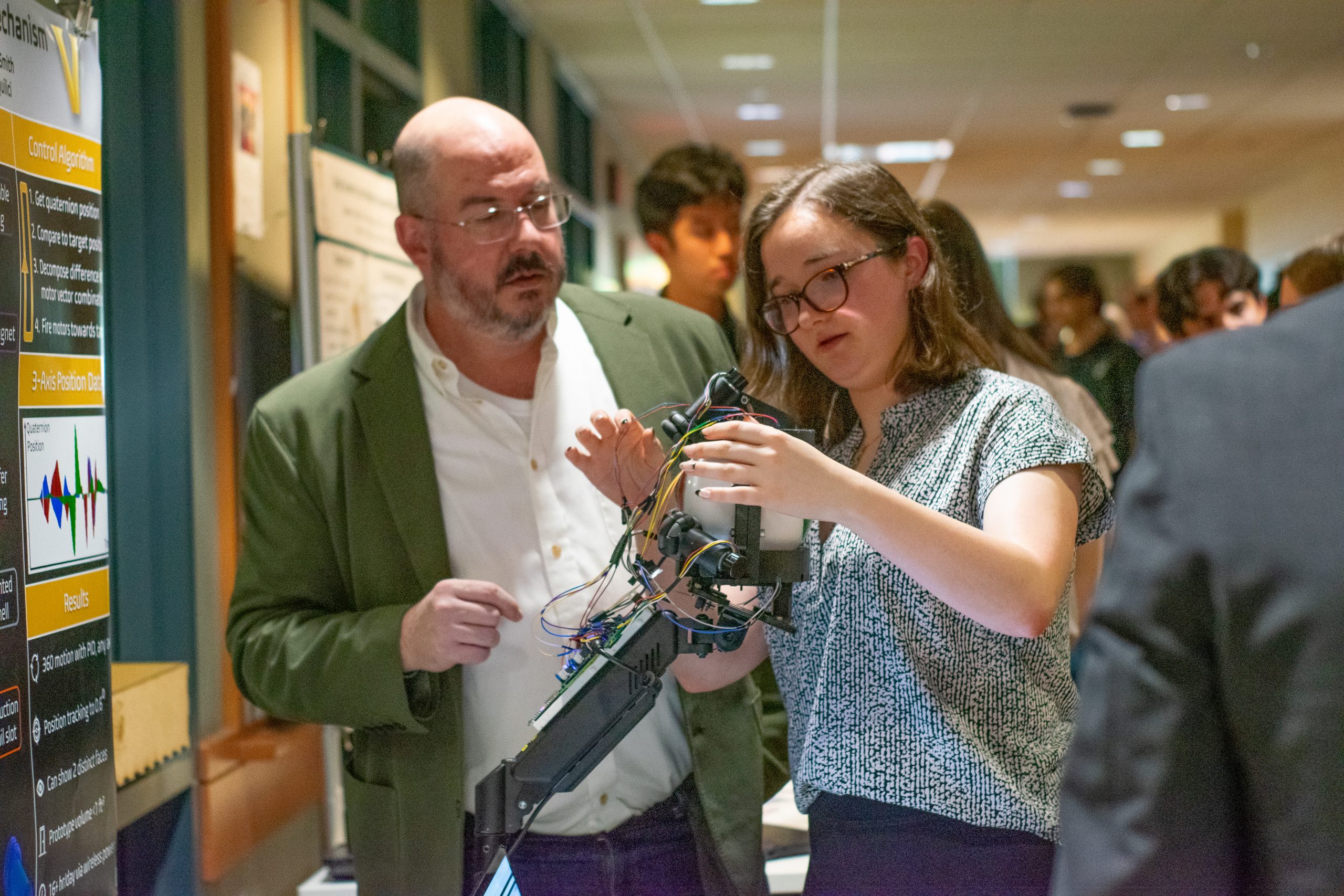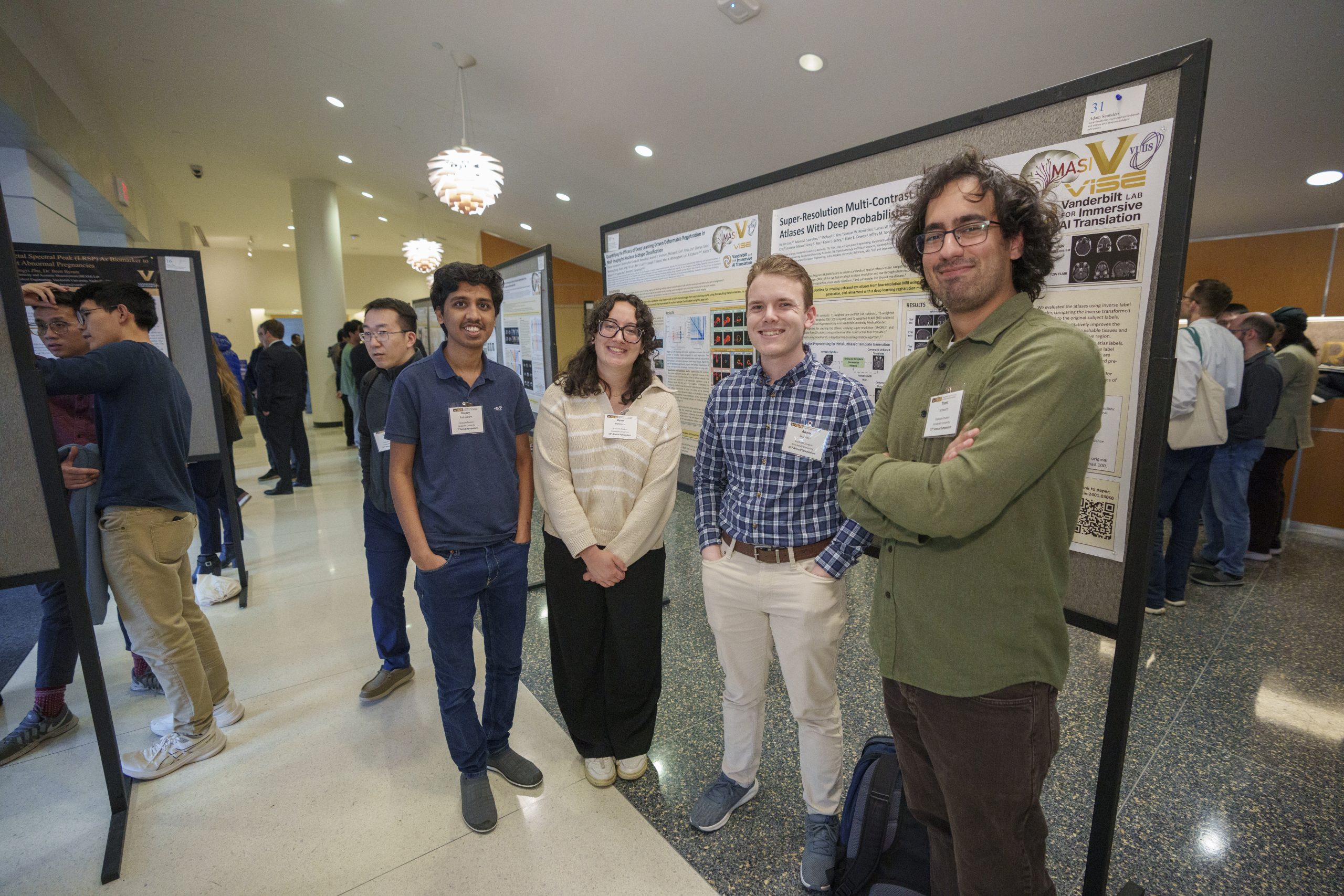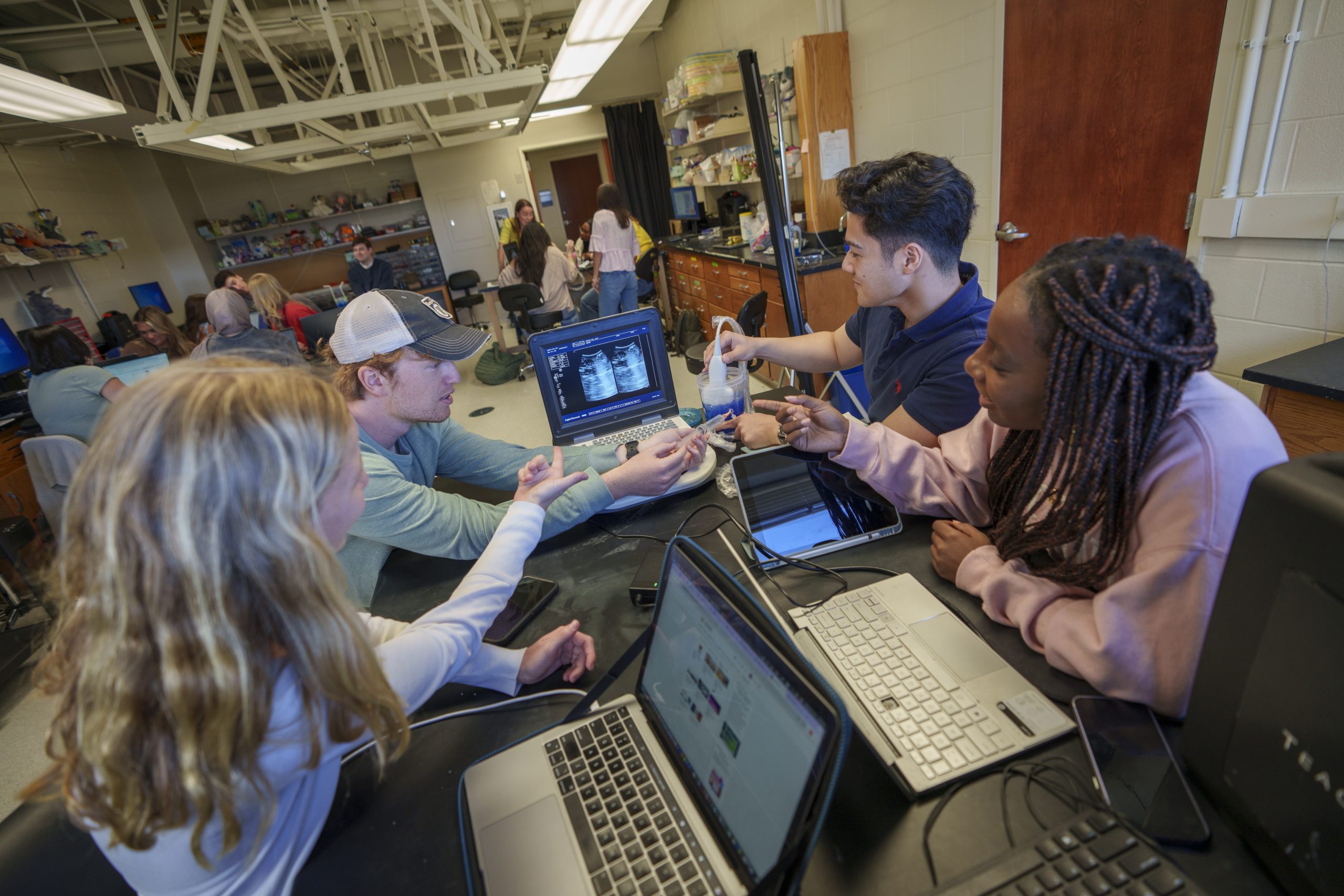
Vanderbilt University has received a catalytic $30 million gift from John Addison, BE’01, and Shannon Addison, BS’02, to ignite a bold new era of innovation at the School of Engineering.
Their visionary contribution serves as the lead commitment for Power the Impossible, a new $300 million fundraising campaign in support of the School of Engineering. Building on the remarkable momentum of the university’s record-breaking Dare to Grow campaign, Power the Impossible will position Vanderbilt Engineering among the world’s most influential, impactful and recognized engineering institutions of this century.

Photo: Harrison McClary/Vanderbilt University
“The School of Engineering is entering an era of bold transformation, rooted in the values and mission that have long defined its excellence,” Chancellor Daniel Diermeier said. “John and Shannon Addison’s leadership gift, combined with the generosity of the broader Vanderbilt community, will empower Vanderbilt engineers to turn today’s complex and seemingly intractable challenges into tomorrow’s breakthroughs.”
The Addisons’ gift, the first major commitment to Power the Impossible, has served as a force multiplier, helping build invaluable momentum for the initiative. Thanks to additional commitments from alumni, parents and friends, including a gift from the A. James & Alice B. Clark Foundation for the Clark Scholars Program; a commitment from Laurel and Cliff Asness for the Frist Center for Autism and Innovation and the Institute of National Security; as well as matching funds provided by the university, the initiative has raised more than $135 million to date.

Fueling the Future of Vanderbilt Engineering
Power the Impossible is propelling the School of Engineering to new heights through investments in state-of-the-art facilities, faculty excellence and student success. By investing in these priorities, supporters will create the foundation for a future where Vanderbilt is recognized among the top engineering schools in the world.
Building this foundation starts with the bold transformation of the school’s learning and research spaces—expanding and modernizing facilities—and the strategic recruitment of more than 55 faculty in core engineering disciplines to deliver exceptional teaching, research and mentorship.
“The School of Engineering is entering an era of bold transformation, rooted in the values and mission that have long defined its excellence.”
This elevated learning environment will enable the school to continue to compete for the brightest students and faculty, spark interdisciplinary breakthroughs and ensure unmatched educational and experiential learning opportunities for Vanderbilt’s engineers.
In 2024–25, the School of Engineering recorded $90 million in research funding—an all-time record. In the past two years, the school has launched nine startup companies and secured 38 licensing deals and options from invented technologies. These achievements are leading indicators of impact that reflect both the scale of discovery and innovation taking place at the school and the peer and investor confidence in its faculty expertise.
Support for Power the Impossible will build on these achievements to fuel even greater discovery and innovation that leads to products and solutions with meaningful societal impact.

Photo: Harrison McClary/Vanderbilt University
Preparing the Next Generation of Engineering Leaders
“The Power the Impossible campaign reflects the shared commitment of our faculty, staff, students, alumni, parents and the university to ensure that future generations of engineering leaders have the resources they need to achieve and innovate far beyond what they ever imagined possible,” said Krish Roy, the Bruce and Bridgitt Evans Dean of Engineering and University Distinguished Professor.
“The School of Engineering has established a bold, courageous road map over the next decade to develop solutions to the most pressing societal and scientific grand challenges of our era: improving human health, ensuring a sustainable planet, enhancing national security and innovating beyond Earth. We hope this transformational lead gift inspires others who will join us on this vital Dare to Grow journey to become one of the world’s most impactful engineering schools of the 21st century.”
In alignment with the goals of Power the Impossible, Vanderbilt recently announced its commitment to increasing undergraduate enrollment to graduate 300 core engineers each year by 2030.
To support this effort, the university will begin construction of a new residence hall for first-year students, which will be completed in time for the 2027–28 academic year.
“The School of Engineering has established a bold, courageous road map over the next decade to develop solutions to the most pressing societal and scientific grand challenges of our era: improving human health, ensuring a sustainable planet, enhancing national security and innovating beyond Earth.”
“We are proud to support the School of Engineering’s ambitious enrollment goals and expand opportunities for future innovators,” Provost C. Cybele Raver said. “Our plan for a new residential college underscores our commitment not only to engineers but to all undergraduates, fostering an environment where collaboration and innovation thrive.”

Photo: Harrison McClary/Vanderbilt University
Powered by Visionary Partners
As Vanderbilt advances these ambitious initiatives, it is generous supporters like John and Shannon Addison who fuel the university’s momentum.
“We believe this campaign and our investment in the School of Engineering are vital to Vanderbilt’s pursuit of becoming the great university of the 21st century,” John Addison said. “By expanding access for talented students, fueling groundbreaking research and innovation, and transforming facilities into collaborative spaces that spark discovery, we aim to empower the next generation of leaders and problem solvers. Our hope is that the vision of our university’s leadership—and our gift—will inspire others to join us in making a lasting impact.”
John serves on the Vanderbilt School of Engineering Council of Advisors and the Chancellor’s Circle. In 2024 he was inducted into the school’s Academy of Distinguished Alumni; Shannon was recognized in the school’s Circle of Distinguished Friends. Both serve on the cabinet of Vanderbilt’s Dare to Grow campaign.
John graduated from Vanderbilt’s School of Engineering in 2001 with a B.E. in chemical engineering, a B.S. in chemistry, and a minor in economics.
His career started as a reservoir engineer on Shell’s Mars platform in the Gulf of Mexico. After Enron’s 2001 collapse left him unemployed for six months, he rejoined Shell in its trading division in 2002. He advanced through six roles in three years, delivered a multi-year delayed OpenLink risk software implementation in six months at age 24, and began trading at 25.
“By expanding access for talented students, fueling groundbreaking research and innovation, and transforming facilities into collaborative spaces that spark discovery, we aim to empower the next generation of leaders and problem solvers. Our hope is that the vision of our university’s leadership—and our gift—will inspire others to join us in making a lasting impact.”
Recruited by Glencore in 2005, John ran the Gulf Coast gasoline blending and trading desk through Hurricanes Katrina, Rita, Ike and Gustav, and he managed the U.S. shift from MTBE to ethanol. Since 2009, he has been at Vitol, where he is a senior partner, head of refined products in the Americas and part of the Americas management team. He has successfully navigated events such as hurricanes, Superstorm Sandy, COVID, the Saudi-Russian price war, Russia’s invasion of Ukraine, closure of many North American refineries, OPEC+ cuts, the 180-million-barrel strategic petroleum reserve release and major unplanned refinery outages. He has served on Vitol’s Trader’s Committee, co-headed Vitol’s Global Trading Initiative and is president of Vitol Aviation in the Americas.
Shannon graduated from Vanderbilt in 2002 with a B.A. in psychology from the College of Arts and Science and a B.S. in human and organizational development from Peabody College of education and human development. She received her J.D. from Emory University School of Law in 2005 and went on to practice with Baker Botts and Kirkland & Ellis. She is currently practicing law in Houston, Texas. In addition to her legal work, Shannon is an active community volunteer. When she is not volunteering in the classroom, serving on school or community committees, or teaching art history at St. Francis Episcopal School, she lends her time and support to a variety of philanthropic initiatives across Houston, where the Addisons live with their three children.
Dare to Grow
The Addisons’ investment fuels the extraordinary momentum of Vanderbilt’s historic Dare to Grow campaign, which surpassed its original goal of $3.2 billion 20 months ahead of schedule and has now exceeded $3.5 billion. Support for the campaign catalyzes some of the university’s most groundbreaking initiatives, including Vandy United, enhanced presences in New York City and West Palm Beach, and signature programs like Opportunity Vanderbilt and the Residential Colleges.